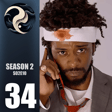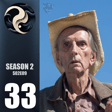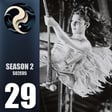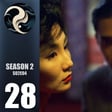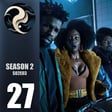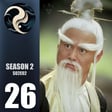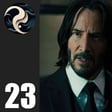Become a Creator today!Start creating today - Share your story with the world!
Start for free
00:00:00
00:00:01

Episode 004 - The Recipe for Redrum
In this episode we discuss the ingredients that go into making a great horror
Sifting through decades’ worth of mass media consumption, my friend and fellow cinemaphile Scrumpy joins me in discussions on film from the low to high brow
CREDITS:
Intro scene from Sam Raimi's "Army of Darkness" (1992) from Dino De Laurentis Communications, Renaissance Pictures, Introvision International (distributed by Universal Pictures)
Opening music: https://pixabay.com/music/id-116199/
Closing music: https://pixabay.com/music/id-11176/
Two Oceans is a creation of Siouxfire & Scrumpy in association with SiouxWIRE
Transcript
Introduction and Podcast Origins
00:00:05
Speaker
Two oceans. Two oceans will begin. Seems fairly obvious. Wait a minute. The words. Right, right, right. Say the words.
00:00:38
Speaker
Clattoo, burrata. Necti, nectar, nickel. Oh, noodle. It's an N word. It's definitely an N word. It was definitely an N word. Clattoo.
00:01:07
Speaker
Marada!
00:01:20
Speaker
Welcome to the tuitions podcast where myself, Sufire, along with my friend and knowledgeable colleague, Scrumpey discuss film and other media through a decades long lens of mass media consumption. In this episode, we'll be starting our Halloween horror series covering what makes great horror. This is the tuitions podcast. And so light the candles, draw the curtains and pull out the Ouija board as we begin episode four.
00:01:56
Speaker
Talking about then demonstrating the power of the edit.
00:01:59
Speaker
And if you look at the scariest, well, in my mind, scariest films, Shining, no jump scares, right? Two pedestrian for Kubrick. Two pedestrian, right. And back when we were kids, like probably the biggest jump scare that I remember is that end Friday the 13th. That was so successful. It's been copied.
00:02:25
Speaker
It's just useless now. One, it's the jump scare. And two, it's the false security at the end of the movie. And it's just been done to death, hasn't it? By and large, although I think some of the more recent stuff, now you'll see it more employed tactically, like an homage in some of the better films now. And you're like, oh, nice use of a jump scare. I didn't expect the jump scare jump scared me.
00:02:54
Speaker
Like, I didn't expect to see a jump scare because they've moved so far past it that now it's like, hey, remember these? We're just going to show you what these things are. Oh, good. That was well done. Well, then we move on.
Defining Great Horror Films
00:03:05
Speaker
I like a good jump scare, but I think you need to be tactical with it, right? I'm trying to think of some examples of this, but they're films that use it really early on.
00:03:17
Speaker
And it instantly puts the audience on jitters. Oh, I'll tell you what, The Descent. You know the movie about the women that go caving. And there's a bit of the beginning where you have some backstory and there's a great jump scare that comes out of nowhere. But then that sets you on edge. And sometimes, if I remember, that's really the only one. That's the thing.
00:03:45
Speaker
is you could set up the jump scare, and then everyone's nervous about when that's going to appear again. And sometimes it never appears because that's the whole point is that, you know, the audience are on edge of their seat. And, you know, the, I mean, there's just to show the positive example of where it's employed, like, I think once in the movie, The Exorcist, part three, yeah, Exorcist, part three.
00:04:11
Speaker
Oh, okay. I don't remember that one very well. I'm scared that's in there. I mean, I could, we could do spoilers or we could keep it free. But the one in there is just, that's, to me, that's the top. It's in the background, isn't it? It's so good that I can rewatch it, know it's coming. And still,
00:04:28
Speaker
It still hits. Does that have to do with someone passing from door to door in the background? It's down a hallway. That's it. That's it. Yeah. And it's just like, holy cow. Did I just see that? Yeah. And also too that just thinking of it too, it's also what the jump scare is.
00:04:54
Speaker
When there's that are the most effective, like the set and the Exorcist three, those, um, because the consequences are devastating. There's actual something harmful. There's something, you know, as part of a horror movie, right? Um, versus when we're like, Oh, the noise was just a cat or all jump scare. Yeah, exactly. It's just that one.
00:05:16
Speaker
lazy. Unless you're making a complete joke about it, which I think some people have. I'm just not calling any examples to mind. Oh, hi neighbor. Yeah, exactly. Oh, it's just a neighbor.
00:05:33
Speaker
Actually, what we were just talking about there and setting that jump scare early, another thing I've got down is I think in horror films, it's really important to keep the audience off balance. Just be unpredictable. Do things like question the trust in the character.
00:05:56
Speaker
or characters, who can you trust? Will the protagonists stick together or will they turn against each other? And on the first point of trust, you have films like Invasion of the Body Snatchers, The Thing, Event Horizon,
00:06:13
Speaker
Rosemary's baby, you know, all those folk horror ones, even Get Out or Alien, right? You've got this sort of questioning whether the group, who within the group you can trust and whether or not the group is going to hold together.
00:06:29
Speaker
right? Actually, that holding together of a group or a family is something that you see in Hereditary, or The Descent, like we mentioned before, where, you know, it can go south really quickly, or Blair Witch, right? You know, they're friends at the very start of the movie, but then as things go on, you know, everyone's kind of out for themselves. And then, you know, you get the repercussions from that.
00:06:54
Speaker
And thinking about zombie stories, they're most entirely about who you can trust. You know, the threat is less the zombies than the human beings. Breakdown society, right? Right, right. And it's that whole thing, like, just keep your audience off balance. And I suppose another thing that happens in a lot of horror movies I like is that trust in perspective
00:07:22
Speaker
Is what we're seeing the truth? Is this a reliable narrator? Do they have all the information to draw the conclusions that they have? And for films with monsters or supernatural, I love it when they don't explain everything about the rules around the monster. It just is. It just is, yeah. And I suppose that's another thing about movies
The Art of Practical Effects
00:07:50
Speaker
with monsters in them.
00:07:51
Speaker
keep them mysterious. I don't want to see them, you know, like a Wikipedia entry. You know, just think about the first two Alien movies. Very rarely do you see them full on, right? And usually maybe if you do see them full on, it's in silhouette so you don't really catch all the detail.
00:08:16
Speaker
It's it, but then and I think the mistake that Genet made in the third one was we saw them swimming through the water and the light and it was CG as well. So, you know, maybe that has something to do with it as well. Yeah. But I think that's the big part. You know, again, it's tactical, right? Again, like we talked about with the jump scares, I think a lot of it comes down to more thought to it than just saying we're then relying on it as a gimmick.
00:08:44
Speaker
Because I will take the dude in the rubber suit just about any time over CGI. Right. And that's a horror more so than anywhere. It's like, dude, you could do the practical effects.
00:09:00
Speaker
And like, it's gonna be better if you do the practical, just that. You're gonna get a more real reaction from the people that are there. Exactly. Exactly. Like, can you imagine? Well, I don't think you don't have to imagine the thing where you make, or that was supposed to be the prequel or whatever. I didn't watch it. It's all CG. And it's just like, it hits so hollow. And it's just like, I mean, again, some good, you know, some decent performances in there, they try to set the mood up all right.
00:09:30
Speaker
Uh, you know, it's good at talking about the first movie, but it's still, there's a lot of other things why it's totally off balance. It shouldn't have been done in the first place, but, um, yeah, compare that to, you know, the glory that is the original.
00:09:42
Speaker
And the practical effects and just like you could not, you know, we're reacting as the audience, as if you were, we're reacting with them. Yeah. Yeah. And that's just going to hit harder when it's practical, when it's something that physically you're having to interact with, uh, you know, back to pray. It's a dude in a suit, you know, the whole time. Oh man, you feel it. You feel it. And, and do you know what? I, I wasn't sure, you know, for some of the bits and I, I was at extent that, that I went back and was like,
00:10:12
Speaker
Oh, it was real. Well, no wonder the performances are so good. Yeah. Something that you just assume, right? You're like, Oh, well, surely they just did that. Nope. Nope. They had people that worked. It's good enough. Nope. There are good enough physical actors out there to, to accomplish these things. You know, or, uh, you know, talking about, uh, the scent, you know, his earlier film, dog soldiers.
00:10:34
Speaker
They were on the lower budget so they couldn't do CGI so they had to have dudes in werewolf costumes Oh, they're good though, and they're really good But you also to go kind of counter to your point which I get though of the of the monster reveal right is that you see them in full and you know, that was the in full light, you know, and that was the that whole thing with Rick Baker doing the effects on you know American werewolf and then the
00:11:02
Speaker
the Howling and those both coming out the same year.
00:11:07
Speaker
Yeah, I'll change my response a little bit is keep it hidden. But like, OK, the alien queen, I think, is a good example where you never you they keep dropping hints that there's a queen. You see the eggs. You don't really see her. You see bits of her and they save the reveal for a point when it really has an impact. So you get to the conclusion. Right.
00:11:36
Speaker
And there she is in all her glory. And again, but incredible, you know, they they they mocked it out with like cardboard and garbage bags. Garbage bags. Yeah. Just this giant, giant thing that's that's that's, you know, as seen on screen. You know, they're not lying to you. But they don't hold back.
00:11:55
Speaker
Right. Right. Or American werewolf, you never see the werewolf for a really long time. But when you do, like, I think you get a full on shot of the werewolf in the underground. You get a split second, but an impressive split second. Yes, exactly. It's again, tactical, right? It's right. Just just going in there much more preserved. And a lot of times they're doing that because of budget.
00:12:23
Speaker
We can't animate or have this full werewolf, but we can do a head. So you just see the teeth and the nose and the snout and that and like, okay, this works. Actually hatching, which I watched yesterday as well.
00:12:41
Speaker
And I really enjoyed that. But there is a bit in the middle where I think they showed the thing a bit too much. And I was actually starting to lose faith. But it's fine. It takes an unexpected turn. But yeah, it's seeing the creature there. And I'll give them this. It is practical, right? They built the thing.
00:13:11
Speaker
It took away some of the mystery at that point.
Isolation and Tension in Horror Films
00:13:15
Speaker
They gained it back again, but I wish they hadn't dipped like that in the middle. Yeah, that's too bad. It's a good movie, by the way.
00:13:26
Speaker
Oh, the other one about keeping the audience off balance, and this is kind of keeping the audience off balance, is the isolation of your protagonist, some cabin in the woods, empty hotel in the winter, Arctic base, aboard a spaceship or on the ocean and then, you know, in some remote place, or even just social isolation, right?
00:13:51
Speaker
Um, so you got movies. I don't know if you saw St. Maude, I saw that recently. That's pretty good. Uh, or repulsion or sensor or the Babadook, even though these people are mixing with other people, they're kind of isolated people, you know, the characters, or at least the situation they're in. And they feel like they can't really sort of share it with anyone. Like in Poltergeist, the family are very social at the start of the movie, but as soon as they start to have their problems,
00:14:20
Speaker
They kind of feel like they can't really share it with anyone until they get the clairvoyant in. But yeah, I think that isolation is a big one. It seems to sort of span across a lot of the movies that I quite like. It goes two ways, right? Some of them, like some of the more recent, like between Insidious or
00:14:44
Speaker
What's the other series with the same actor, dude? The Conjuring. Conjuring once. Where the families have to or there are people that have to reach out. Right. To get help.
00:14:56
Speaker
And, you know, kind of, they have to expand, you know, their, expand their area of expertise. And fortunately, you know, those they do it. And fortunately, in the non, non racist ways, or such, where you're like, Oh, well, you know, usually in horror films, like, Oh, we need to go see, you know, the, the gypsy, or the, you know, the bruja, or the, you know, fill in whatever ethnic
00:15:23
Speaker
thing you're trying to go for something there, you know, where they just become and those people become these tokens, right? It's like, Oh, well, they're brown skin, so they're gonna be closer to the supernatural. Like, because there's a there's a weird racism that runs through a lot of horror movies. Hold your guys too. But that idea, right of just, you know, the,
00:15:50
Speaker
When you're talking about the branching out, but talking about also being smart about it, it's like, oh, okay, the priest is gonna come in because they're...
00:16:00
Speaker
they're more in touch with a supernatural. It's like, no, they're not. Come on. I mean, it works in The Exorcist, leave it alone after that. Do you know what, actually talking about the sort of like holy supernatural stuff, I have to call out the rec movie or at least the first two rec movies, a couple of my all time favorites. And it was done so well there.
00:16:24
Speaker
that they held it back like it could go it's a zombie movie and then eventually as as these little clues sort of drop that there might be something kind of satanic going on by that point it was like it was scary enough man you're taking it up a notch now and it was a bit in the mouth of madness I thought or no the Prince of Darkness Prince of Darkness reminded me of yeah
00:16:50
Speaker
And I suppose another thing about that isolation is doubling up the threat. Say, for example, in The Witch, even before anything supernatural comes into frame, the family is already in a really dire situation, trying to survive on their own in the wilderness.
00:17:12
Speaker
Um, so you have the wilderness as almost another antagonist and with the thing as well, it's like, well, you could stay on the base, but you probably get taken over by an alien or you could go out there and die. You know, there's like no choice. Um, but yeah, yeah, I think sort of doubling up the threat like that.
00:17:33
Speaker
makes it enhances things. Yeah, there was one Canadian one called Pontypool. Yes, I saw that. It's the radio station, isn't it? It all takes place in the radio station and only from their perspective. Yeah, really good. Everything is going to hell outside and they have to deal with it like we do. And I thought that was great. I thought that was so well done.
00:17:54
Speaker
God, we've watched a lot of movies if we both see a Monty pool. Exactly. If I could bust that out and you're like, oh, yeah. Oh, duh. Anyone listening, Ponty? That's a real name? You're making stuff up. I'm turning off. We're going to have to put a list next to each of these podcasts so people can look them up. Another isolation thing, though, that works.
00:18:20
Speaker
And it's the, uh, kind of like the descent in a way where you, you, you end up, you can't escape. So you end up going deeper in, right? And that's another, it's a bit of a trope, but you can do it really well. Um, uh, the autopsy of Jane Doe.
Simplicity and Mystery in Horror
00:18:35
Speaker
I don't know if you've seen that one. I have seen that one. They have to go in deeper, and the deeper they are, the more they're screwing themselves. And you can see that it's going to happen, but you can't stop. You're like, but they've got to find out, right? They've got to figure this out. Actually, Auntie Pool and Jane Doe are quite similar, in a way, in terms of being at a single location in the movie. A pretty basic premise, but they really do well with what they've got.
00:19:04
Speaker
Well, that's another thing when you're talking about what makes a good horn. For me, that's one of the keys for me where horn can really work is basic premise.
00:19:15
Speaker
you know, ultimately something pretty simple. Super focused. Exactly. You know, don't get I mean, obviously, there's a lot of things you can pile on to it or extrapolate from it. But you know, with the basic core, it's like, what is the threat? What is the horror? You know, aspect and but you know, don't convolute that. Yeah, you know, it's like,
00:19:37
Speaker
I think that's what I meant about like, not giving too much information to the audience as well, because then it loses all its mystery. When you start throwing in all this world building, it's like, I don't care. Like, you can do the world building, sure, when you're writing the script, don't show the audience. Like, when Blair Witch came out, I could tell
00:20:01
Speaker
that they started building up all this lore in the background. They didn't show it all on screen. I think the interviews at the beginning kind of hinted towards stuff. And it was all pretty vague. And you had enough room to kind of interpret it, which made the finale that much scarier. Because it was like the one bit of information that you had that was kind of concrete. And there it was. Yeah.
00:20:28
Speaker
And I think also with what we're talking about sort of doubling up threat as well, is that sort of enhances that isolation and all, you know, all the threats that you throw at the characters, you know, even in those two movies that we just talked about, there's always this thing about, are the characters going to stick, stick it out together? Or are they going to?
00:20:51
Speaker
Just like, you know, this is this is yeah disintegrate dire situation to hear everyone out themselves kind of well And there's two things with that that set up as well when you're building that mood and establishing all that there's one It's it's basically and you know, so many horror movies and sci-fi movies do this where they go into the space that this whatever the horror occupies or that they find, you know that kind of like
00:21:18
Speaker
there's this weird contempt almost for the characters and Blair Witch has that. It's that thing, they go in to the place they shouldn't and it's basically like, again, one of those core horror things is the turning the tables on man's hubris and man thinking they are.
00:21:38
Speaker
kings of this domain when they're not. But the other, but it can go wrong, right? It's like, like, no, you went into, you know, these movies like, oh, they went to the bottom of the ocean. They found bad stuff. Like, don't go to the bottom of the ocean. You know, it's, it's like the premise is just like, come on. Okay, that's kind of neat. I get, I don't know.
00:21:56
Speaker
Right. Versus the other is where there's the multi-character setups versus, you know, where you have kind of expanded cast, where you have characters that you want to see die, right? You want them to get killed. Oh, right. You know, Blair, Blair, which I just like, I want them all dead now. When, when does this happen? When does the, when does the witch show up and kill them? Uh, you know, kind of tick tock, uh, you know, you don't pull for anybody, uh,
00:22:22
Speaker
you're not really rooting for anyone and rather that, you know, cause there's this weird.
00:22:27
Speaker
I don't know if it's a, you know, misogyny or something like that. Oh, yeah. Yeah. Because that's the whole setup of your next, isn't it? Kind of, but they actually, and to spoil it, you know, they actually kind of pull out of that. They realize that's what it is. And it becomes then this other story of like, Oh, then why are they, you know, they actually, I think that in that, that's a good example of them playing it smart. It does start that way.
00:22:55
Speaker
Yeah but they switch gears very creatively and make something a lot strong like. Pull that to the commentary of like yeah this is why this is happening but so often and so many crappy one specially after. Oh you know serve your teenagers up on a platter and it becomes this weird judgmental.
00:23:15
Speaker
uh you know conservative judgmental oh yeah totally those the rules you know we know what the rules are we know who's going to die um or or did you see ready or not uh yes yeah that's quite similar to um you were next as well in some ways um and the hunt uh and the hunt i would throw that in i'm yet to see that when it's on my list that's good um
00:23:39
Speaker
kind of moves the goalposts as well as like Ready
Thematic Depths in Horror
00:23:43
Speaker
or Not. No, I liked Ready or Not just because again, it kept it simple, but it kept everything upfront. They're like, oh yeah, this is why we're doing this. It wasn't like this really grand reveal. I mean, it kind of was at the end, right? Because you just finally got the information. And there's like, oh, if we don't do this, things are going to go wrong. And it's that weird thing, kind of like you bump into it superhero movies.
00:24:04
Speaker
Will this evil danger whatever is it a threat just to the people there so basically you go into the evil's house and it screws with you and you're like oh no like what you have in there. So is it just a threat in that location to that spot those people or is it the again with the broader like superhero movies do every time we have to save the world.
00:24:26
Speaker
Not every story you have to save the world. Sometimes the threat is very immediate, very close in. You know, like the thing, you know, that's the alien has the potential to wreak this havoc, right? It's just the isolated setting is like they realize that's the, you know, that's the last line of defense kind of thing.
00:24:43
Speaker
versus something else where you could pull up like psycho, for example, and say, Norman Bates is a threat to others that happened upon this remote section road in the middle of nowhere.
00:24:59
Speaker
I wonder if that whole thing about it having to affect the world is like something that's come out of old movies so that like 50s and 60s as a science fiction there was always had to be about the end of the entire world. Whereas I think we've gone past that now but some people haven't realized that yet. But yeah it becomes like oh no it's like oh the ghost is just going to harm them.
00:25:24
Speaker
Okay, but then you know, at least they're not treating it like, you know, it's like, okay, that's a that's a threat. That's a present thing, you know, again, go to the insidious movies or something like that, you know, it's like, oh, yeah, the evils in your house, or in your family, paranormal activity did that too. They're like, you know, it's like, you know, it's like, well, why don't you just move? And they do and it still follows. You know, that's a good idea. I like that idea.
00:25:47
Speaker
I mean, it's also just a bit of a side note made me think of something is like the bond movies as well get quite boring for that as well. It's like, this is gonna be the end of the world kind of thing. Whereas if I think back to the bond movies that I found most interesting, I thought licensed to kill was kind of interesting, because
00:26:06
Speaker
That was a lot more of a closed story and kind of a vengeance story and almost not a bond story. I didn't have all those markers. But yeah, it is interesting when they kind of stray off the path. Well, in the underrated Timothy Dalton in that role too.
00:26:22
Speaker
Oh yeah, Timothy Dalton's great. Yeah, hot foes. Yeah, the same thing about not giving the information, too much information to the audience, I think is really important because the second the audience feels comfortable in a horror movie, you know, you've kind of killed it. You know, having that sort of mystery
00:26:43
Speaker
Actually, that's something that the foreign language horror films have an advantage over because they have an inbuilt kind of virtue of showing us something unfamiliar. Right, at least for us, right? For English speaking people, yeah. The ones that matter. But yeah, the ones that are right. Oh dear.
00:27:07
Speaker
fuck yeah um the uh yeah but but that that mystery of like i think some movies you know some people don't respond well to that kind of what the fuck am i looking at you know um whereas i do i i i i i i love
00:27:25
Speaker
I hate it when I walk out and at the end they go, they do the Scooby Doo thing of this is an explanation of everything that's happened. And I'm like, God, I didn't really need that. You know, I think the best horror movies actually leave it kind of open. And I'm thinking here of like The Thing or Invasion of the Body Snatchers or
00:27:49
Speaker
even the first Alien film to degree, and then Halloween, you know, the body's not under the balcony anymore kind of thing. I love that. I love that they don't completely kind of shut it off at the end. Agreed.
00:28:06
Speaker
Because then you get to take home the worry of, you know. Yeah. What else did I put on my list? Grit. And I mention this every week. Grit. I just like having some grit in the movies. If it's too glossy, you know, I think that's what lost me on the Scream series. They were just a bit too damn clean for my liking. Do you know what I mean? They felt a bit...
00:28:37
Speaker
I mean, I really liked the first one, but you know, I don't know, it's just a bit too film setty kind of cleanliness that doesn't feel convincing to me. But yeah, yeah. And another one is subtlety.
00:28:54
Speaker
And I suppose that kind of goes back to not giving too much information and also sort of straying away from the, the, the, the tropes of horror. Like it follows was really interesting. I was going to bring that one up. Yeah. It's one of those ones that, that, that dares to have horror and in broad daylight and manages to be really fucking scary. I think. Yeah. No, go ahead. Sorry. No, I was just going to say that just the beach scene, just, just whoa. Yeah.
00:29:23
Speaker
And for me, that one too, in terms of kind of upending tropes and everything where they try to catch it and they do the whole pool scene. And it fails. And I've talked to so many people about that movie that are just like, oh, that was so stupid. Like, why'd you waste the time with that? But that's what would happen. You're like, okay, we think we can do that. They included it. They weren't successful. Hooray.
00:29:49
Speaker
Like, you know, it doesn't go by your rules. You're like, you're doing the best you can, and your best isn't good enough. You know, that's, you know, which happens a lot in horror movies, right? They're trying to get away, just as well, you get tripped, you get whatever. But you know, in that one, I love the fact that they included that bit of
00:30:08
Speaker
I'm like, oh, yeah, we're going to do this. We got this plan. And oh, crap, our plan is garbage. It didn't work. Oh, you know what that sets up, though, is OK. They got a plan. Like, I think they had so many similar tremors as well. Well, you try the plan. OK, it fails. And then by the time the story gets along to the next plan, you actually aren't thinking, yeah, this is going to work because this is getting toward the end of the movie.
00:30:36
Speaker
You've got some it's just they planted doubt in your mind as to whether or not their plans work. It's it's yeah, this is what I mean. Just just stay away from the tropes like kids can't die. You know, these are the people who have to live, you know, play against those and you'll go far. Exactly.
Gore and Shock Value
00:30:59
Speaker
You'll do well.
00:31:01
Speaker
What else do I have? Oh, gore and brutality. Now, this is similar to the jump scare in that I think it needs to be used sparingly. And if you're going to have gore, really think about why you're using it. I mean, again, just like the jump scares, if you use it early to maximize the threat,
00:31:25
Speaker
But then build tension on holding that back because if you establish in the first five minutes that this horrible thing can happen, then you're kind of nervous for the rest of the film, just like with the jump scares. But if you're using it constantly, then eventually the audience is just going to be like,
00:31:44
Speaker
Yeah, you know, and if you are going to use it, make sure that there's a point to it other than it being torture porn, please, or a misguided idea that brutality equals reality. Looking at you, Cannibal Heart Holocaust.
00:32:04
Speaker
I think some of Trier's films, maybe Antichrist especially, treads a fine line in this one. And certainly there are films that have some shocking scenes, but they're used sparingly to increase the impact. And I'm thinking here about Mother, exclamation point, has one of the most shocking scenes in it.
00:32:29
Speaker
But it's really the only scene in the whole movie that's like that. So the impact by the time that you get to that scene hits really hard. I mean, it would have hit hard anyhow, but it hit even harder because the whole movie did not prepare you for any gore whatsoever, you know? Yeah. I say, yeah, that or you go the total opposite.
00:32:57
Speaker
and just go over the top with it, you know, again, Evil Dead, Evil Dead 2. Oh, right. Yeah. Champions of that, right? It was just like, you know, we could go this way, but we're going to go this way instead. It's just hundreds and hundreds of gallons of gourd is to... Right. Right. To kind of, you know, pull it out for comedic effect and realize it's like, okay, it's still a movie,
Evil Dead Series Insights
00:33:22
Speaker
guys.
00:33:22
Speaker
I just have to say, because I don't think we've talked about this, but I am so grateful that
00:33:27
Speaker
Ash and the Evil Dead had three seasons. Oh, man. Yes. Far better than it should have been. Yeah. Oh, it was. It was Bruce Campbell. Wow. And you make your beloved main character kind of a dick. Yeah. Well, I like the new characters as well. Oh, yeah. They were fantastic. Yeah. Really, really good. They fit so well in with that universe. Did you see the episode of Creepshow?
00:33:56
Speaker
which had the deadites in it. Yes, which was fantastic. Again, introduced another character to the Evil Dead universe that I would gladly watch in a movie. Exactly. Yeah, no, I thought that was sort of the window. But, you know, again, they said, again, as you were talking before, you know, it's a consistency, right? We claim this way. That's how they fit in. We'll build things around it. You know, when you've got it thought out and fleshed out, you know, it's going to be
00:34:26
Speaker
easier to sell, easier to accomplish the horror movie thing that you're trying to get across rather than having to reinvent the wheel. But if you think about Evil Dead as well, even though there's a lot of stuff happening and a lot of blood and gallons and buckets and buckets,
00:34:46
Speaker
It's done in a way that is quite cartoony. Do you know what I mean? Like if you wrote it down on paper, somebody would be like, my God, you can't have that in a movie. But you see it in context and it's quite funny.
00:35:02
Speaker
um and and you think about the out out the uh remake or whatever they call it of evil dead uh that was done and reimagining the reimagining um and that has gore in it too but but it's a lot more mean-spirited than than the original um yeah and two two different things they're going after two different things there um but yeah yeah uh
00:35:32
Speaker
But there was a lot. I found that a hard one to watch. I had to watch it as an Evil Dead fan. I'm still to this day not quite sure what I think about it. I'm torn and like, why didn't you just make a different movie? Why do you have to remake this? But using it in context of addiction and, you know, cost of it. I thought that was really well done. It was
00:35:59
Speaker
I hate to say tastefully done, but there's a certain reality they get used as like, that's the real horror and just losing this control and being lost to it. It's usually in a horror film when that happens to a character. It's like for whatever reason, they're basically hypnotized by something else.
00:36:19
Speaker
aspect of the of the horror of the evil that were possessed or something and they and they lose all fact but you never understand why you're like okay so it's not going to impact our character because they're our main character you know or something you know there's never an explanation it's lazy right which again you akin to our previous episode of Ant Horizons like that for me I hate that movie
00:36:45
Speaker
Oh, I hate that movie so much. Such a good premise. And they spoil it. And that's part of it, you know. But it's the same thing. So if I like another one. Yeah. But you know, but Lawrence Richard is OK. Or, you know, it's like, but why, you know, come on, just like just a little bit more. It's all it takes just a little bit. Well, given the director, I think it's his best effort.
00:37:10
Speaker
Yeah. Okay. We'll give him a participation trophy. I think that thing, you know, everybody's got one, at least one good movie in them probably. Some of them never find it. Rob Zombie. Yeah. What else do I have on here? CG is not scary. Yeah.
00:37:32
Speaker
I think I think we already touched on that. We talk about practical effects quite a lot, but I think a good example of the alternative is Toby Hooper's Poltergeist, which has a lot of special effects that would by default be CGI now, but they did through, you know. And the Poltergeist remake they did.
00:37:57
Speaker
No, no, no, I'm talking about the original Poltergeist. Right, but in terms of the CG. Right, right, right. Yeah, there'd be a bunch of CG and all that. But the original, when they created the ghosts and they put them under water and then filmed them at high speed and then slowed it down,
Practical vs. CGI Effects
00:38:18
Speaker
you know, it's been being superimposed into the picture, but it's blended quite well.
00:38:25
Speaker
And there's something unearthly about it, which is perfect if you got a ghost, right? But I will give that some of the elements probably could have can be CG. So for example, when Carol Anne goes up to the television and kind of a ghostly, smoky hand comes out of the television. And you can tell that was hand animated.
00:38:53
Speaker
Now, I think that could be replaced by CGI. Right. And and you'd get a more natural movement and look more convincing. That's OK. But the ghosts, I think, would not work as well as they do. Like, I remember the first time watching Poltergeist and being so freaked out that there's this thing with the long arms hunched down in the hallway and just an amazing effect.
00:39:21
Speaker
And I don't think it would have had the impact if it was CG. Yeah. And I think, you know, there's examples of, you know, when it's employed well, but you also you may maybe use a new technology, but you're also employing it, you know, whoever is doing it, it's taking the care to make sure it's not going to look stupid. Right. And you can look at the frighteners that way. Yes, yes. The effects in that are fantastic. What? And for having no budget and doing it, you know, so many years before
00:39:50
Speaker
it seemed like they were ahead, you know, whatever I was doing or something at the time, they seem to be ahead of the curve, you know, a lot of ways, right? Because they were. But, you know, more of a passion project, perhaps, or something like that. But, you know, the effects of that, I mean, they still hold up to, it's great. And that the whole thing with the ghost coming out of the wallpaper,
00:40:13
Speaker
and, you know, distorting that and everything. Like, that's like, that's also, you know, it's in your home. So the setting is like something normal. It's a light, uh, you know, this is on and on. And then it also ties in, you know, the, the, there's the bridge there between the CG and like, because you've got someone who can see ghosts and then you've got someone who's, you know, basically, uh, screwing a ghost, you know, you've got this weird, like, uh, people crossing over there. So it's like, okay, let's make that work.
00:40:40
Speaker
It's better than that. And again, it takes, you just give it the extra attention it's gonna deserve, right? And then it can come across as fantastic. I mean, you just watch it and you're like, wow. I mean, is the movie perfect? No, but is it very entertaining? Yes. That movie should have done so much better than it did. Yeah. For Jeffrey Combs alone.
00:41:05
Speaker
Oh my god, Jeffrey Combs. Jeffrey Combs. Reanimator, which we'll get on to at some point over these Halloween episodes. But Jeffrey Combs, bless him. And he played the question on the animated Justice League.
00:41:23
Speaker
Really? Which is, yeah, you're gonna have to look it up on YouTube. It's about as perfect as you can imagine.
Performance's Role in Horror
00:41:30
Speaker
You know, imagine Jeffrey Combs' voice just coming up with these conspiracies on the back of his research. Right off the bat. Yeah, that's for me, you know, the big things apart from what you've mentioned to him is
00:41:47
Speaker
One of those things is performances. What performance do you ask for and what do you get out of your cast? Sometimes it's very basic ask. We just need Scream Queens or whatever it might be. But sometimes better actors are going to pull in. What are they doing in a horror movie? You're kind of shaking your head and you're like, oh, that's why.
00:42:14
Speaker
Uh, because they're just, you know, they're going to bring the gravitas, the
00:42:19
Speaker
everything to it. You know, I think that's part of the appeal for me of Jordan Peele's stuff is that he gets great performances out of great actors who are like, but they're in horror movies. You know, it's like normally, again, it's that whole thing. It's like, oh, well, if it's animated, it's for kids. If it's a horror movie, it's just slasher, you know, slasher and boobs, which don't get me wrong, I like slasher and boobs. But, you know, it doesn't have to be just limited to that. It can be, you know, horror is a range, right?
00:42:47
Speaker
And especially when you're pulling off anything psychological, and going back, you mentioned hereditary earlier. And Tony Colletti and that, there was a lot of buzz that, why wasn't she nominated for an Oscar? I'm like, absolutely. Because they would never give an Oscar to a horror film. Well, they did, I guess, with Get Out, didn't they, for writing or something? Yeah, but they didn't give the actors. But never the actors, right? And it's like, I think it's gaining perhaps more credibility.
00:43:14
Speaker
That you know just in terms of the net is so wide in terms of where productions are gonna happen and what they are now that you know there's a lot more people fighting for you know the spaces, the good spots in the lighting.
00:43:29
Speaker
Daniel Kaluuya in NOPE is amazing, very underplayed performance. I just cannot wait to see what he's in next. I think he's one of those standout actors I've not really kind of felt attached to in a very long time.
00:43:50
Speaker
But yeah, for me, that's one of the things I like about it. Even if it is something schlocky, you're still getting a good performance. You mentioned tremors earlier. That has far better performances pretty much from everyone, almost everyone in that cast. It gets any screen time.
00:44:07
Speaker
Oh, Fred Ward is another one of those actors that that really deserved to be bigger than he was. Like, yeah, yeah. Michael Wynn caught as well. Oh, yes. Speaking of nope. Yeah. But anyway, for me, that's one of the things I like, you know, again, you could tell it's the
00:44:28
Speaker
Directors really working well with what they got but also, you know working well with their actors, you know, I think hmm You know that like the Final Destination movies are they you know, are they entertaining? Absolutely But they you know, they make they make it do they make it work
00:44:43
Speaker
Yeah it should be just you know. And it's another one of things sort of a self-awareness of horror movie trappings and trying to either work against them or work with them address them play with them i think that's the entire final destination series.
00:45:04
Speaker
is kind of just a laugh in the face for all the jello films where it's like, oh, you have to be in this specific spot at this specific time. And then you die in this really weird, specific way. And it's like, you know, in jello sets, it never made any sense. But in Final Destination, I'm like, oh, because death is coming for you, it's always looking for the opportunity.
00:45:22
Speaker
We're gonna do these Goldberg setups and we're gonna show you where you're at. Yeah, exactly. Exactly. So, you know, that's again, it's it's paying attention to those kind of details and getting getting performances out that sell it to me, you know, something quite interesting is that that that I don't think we've we've touched on yet we were sort of talking about like our being this monolith
Horror Sub-genres and Sequels
00:45:44
Speaker
and
00:45:44
Speaker
But there there are there's so many sub genres to horror as well. You know, you got the art house horror. So you got you got the schlock or you got in there. They're all they all have their merits. They're all fun. But they're all very, very different. So it's what I don't like when someone goes, well, I'm not really into horror. It's like,
00:46:07
Speaker
It's pretty broad, you know. I don't like music. Yeah, yeah, right. OK. All right, fine. And if anyone's listening who is looking into making films, I think a good direction to go in to learn the craft is compare good movies with bad sequels.
00:46:34
Speaker
because there's such good case studies on what works and what doesn't. I think Cameron made a great choice to follow up Alien, not with a horror really, but with an action film that respectfully leverages the horror element from the first one.
00:46:54
Speaker
That was a smart move. And again, this goes back to subverting expectations. And then you look at something like David Cronenberg's The Fly and its cash-in follow-up, which I went to the cinema on the day of opening because I love The Fly. And oh, oh, boy. Oh, boy. And there was a good performance in there, too, but
00:47:22
Speaker
Yeah, I think there was one line in the whole movie that I thought was worthwhile and it was in the trailer for it where, you know, he's asked, you know, Oh my God, you're getting worse. And he says it so well.
00:47:38
Speaker
I'm getting better. And I was sold. I was sold on it. I went to go see it. And it was like, gosh, that that that that, you know, five second line is really the only worthwhile bit of this. Somebody owes me big. Did you not understand the first movie? And I remember going into it going, huh, I wonder why Gina Davis wasn't involved with this. Oh.
00:48:07
Speaker
Well, here's your answer. Yeah. Yeah, but yeah, just just comparing Good movies to bad sequels is probably a good exercise. They can write a thesis on it and whatever film school Well, that could be another one or things to the remakes or sequels that actually work or excel or
00:48:27
Speaker
We touched on one of them, which I thought was, Exorcist II, do not bother with. Exorcist III, definitely bother with. Oh, yeah. Well, Exorcist II, God knows what they were thinking. That's to the level of the fly, isn't it? Exactly. The fly, too. It's like, hey, look, money. Yeah, yeah. But I think that could be a whole other separate discussion for us.
00:48:51
Speaker
Or, or another interesting one might be films that had sequels that crossed over into a different genre. A few times. And I find that quite, quite interesting.
00:49:08
Speaker
Uh, yeah, it's like, yeah, there's several with that. Like you mentioned, uh, alien and aliens, but I'd also go with the howling, uh, howling series and where that went. Oh, very interesting directions, but in space, you know, in the hood in space and yeah.
00:49:32
Speaker
Yeah, they eventually got to the point where, you know, they they were, you know, the multiverse stuff started happening a long time ago, where you sort of went and what if if Jason fought Freddie, you know, or, you know, fought Michael Myers, and, and, you know, they had these these cash ins all the time. Well, and let's talk about, you know, that route. Abbott Costello meet the Wolfman.
00:50:02
Speaker
We finally got the universal monsters together until Monster Squad, that's all we had. Well, that was one of my favorites growing up. Yeah, Monster Squad is great as well. But again, separate topic, talking about how the elements of horror, right?
Personal Horror Film Experiences
00:50:18
Speaker
Yeah. As we got 10 minutes, I've gone through all the things I've noted down, but I thought maybe we could spend these last 10 minutes talking about the horror that sort of formed us growing up.
00:50:32
Speaker
Sure. Yeah. Yeah. Well, what was the first horror movie that that really made an impression on you? Well, and it's tough to you know, at this point, because everything's going and especially memory, it's like in terms of sequence, you know, when
00:50:50
Speaker
When Jaws came out, you know, I was seven, but God did I want to see it. When, you know, Friday the 13th came out, I was what, 10? And my sister went and saw it, and I was so jealous, and she doesn't like horror movies. So she's like, oh, it was icky this, I'm like, tell me more! But she couldn't, you know. So thankfully, Home Video Market entered, I was able to start, you know, getting my hands on these things and getting appropriately scarred by them.
00:51:13
Speaker
Or motivated by them right because probably the first you know first ones that came in Because you could watch up on regular TV Psycho and the birds. Oh Yeah, there's especially the birds it's just you you want that whole thing of not explaining a damn thing, but just making it terrifying and
00:51:36
Speaker
Oh, totally. That's like the king of those. You think about that, the birds, just going back to what we were talking about before. It's on an isolated island. It has an ending that who knows what happened next. It sets everything up in the first half and subverts it in the second half of the movie. Yeah, terrific. Well, and again, it's another thing that says it's flying into the face of horror. They're just birds.
00:52:06
Speaker
What's the big deal? Yeah. No, let me show you. Um, so, uh, uh, the shining was one that hit hard for me just because I used to take where I grew up in the middle of nowhere. So that whole idea of the isolation at winter thing was like, Oh yeah, that's like home.
00:52:21
Speaker
My sister took me to go see that at an inappropriate age when it was released. And I remember vividly being in the cinema and not wanting to be there. I found it so unpleasant. And similarly, she took me to go see Poltergeist. And so growing up, those are the two films that I think I saw in the cinema.
00:52:49
Speaker
which I shouldn't have, and really left an impression on me. And also, I remember one time, I must have been seven or eight years old, and my parents left me at home alone, and I was watching cable television, and a commercial came on, and it was like from the mind of Robert Romero. And I was like, oh, what's this? And it just had like a,
00:53:18
Speaker
elevator door. And it kept saying, you know, the maker of, you know, Dawn of the Dead and all this other stuff.
00:53:28
Speaker
Well, actually, I think it was an ad for Dawn of the Dead. And it sort of keeps zooming down the hall to the elevator. And then the elevator doors open, and just the quiet is gone, and these zombies come pouring out. And it freaked me out, stuck with me for such a long time. I remember turning off the television, turning on the lights in the house. It did what it was meant to do.
00:53:57
Speaker
Yeah, I don't care that I'm blue. Yeah. But I also remember really creepy things, not great movies, you know, movies like food of the gods being on television, which had like these giant rats and really kind of hokey, you know, they eat the food and the animals got big, there's giant wasp and all this. They tended to be really gory, you know,
00:54:23
Speaker
Surprisingly gory. And I'm trying to think of a few others. There was that movie about the rats. I think they made the sequel Willard. Was it Ben or something like that? I think it was Ben, but really weird movies. And then you had like things like the Andromeda strain as well.
00:54:47
Speaker
which was like television, sci-fi, but as a kid, I remember thinking of that as hard because it was really weird and unsettling and I didn't know what was going on. Yeah, so for me, Exorcist is the Exorcist and Jaws are the tie for those that mess me up the most.
00:55:09
Speaker
as a kid, like, you know, I used to, you know, deep water, I still assume, doesn't matter what it could be a pool. So I assume there's a chart. That's to be on the safe side. Exactly. But you know, that's the same idea that like, they had that kind of impression, right? You know, like, I remember my grandmother telling me after she saw psycho, you know, she was a younger woman, and she wouldn't take a shower.
00:55:38
Speaker
She refused to get into the shower and she'd take a bath or something like that or make sure the door was locked and maybe put a chair under the doorknob. The impact was so strong because the scenario was so clear.
00:55:55
Speaker
Psycho is another one of those ones. Again, like the birds halfway through completely subverts expectation. Yeah. But yeah, very, very
00:56:10
Speaker
visceral, you know, the shower scene would get referenced all the time. So you would at least see bits of it, or at least hear that damn music, you know, which just sends a chill up your spine. And a human monster. Right, right. That's the one for me, that was the first one I could think of, you know,
00:56:29
Speaker
You know the shining gets it as well a bit but you understand why he loses his mind and what happens to him there too But there that's the human monsters the fact and your idea, you know, it could be anyone right? It's not like right And introducing it in such a way that was just so
00:56:48
Speaker
well done, you know, that too. That's a really good point. Earlier, we were talking about, you know, the overuse Gore or how you use Gore. Texas Chainsaw Massacre. Oh, yeah. It's very controlled. By comparison, right? It's like at the time, it seemed like
00:57:11
Speaker
And, you know, with a title like that, of course, meant to be schlocky. Right. But the concept of it was really measured and it's really well done in that movie. Yeah. Yeah. Same with, I mean, it's the same. Basically, you guys, you know, they're on a tight budget. They can't show.
00:57:26
Speaker
a lot of what they want to do. So they have to create through mood, setting, that sort of thing, editing and all that. Oh, he picks up the chainsaw. There's walking toward the person. There's the shadow. Your mind fills in the rest. Just the guy's bodies twitching in the doorway after he hits it with the hammer.
00:57:45
Speaker
But Hills have eyes, I think would fall under the saying. In a good creepy hillbilly way, which is fine, because hillbillies are creepy. Who I grew up with, I know of when I speak.
00:58:06
Speaker
Yeah, that was in the forest because yeah, we were we were we were in the middle of it. But those were I think yeah, those are probably the main ones that had the biggest early, early in my life impact that I saw anyway, you know, obviously, there were some others later that I saw that were, you know, predated that or around the same time, but didn't know about them or have access to them until much later that
00:58:33
Speaker
Yeah, if I'd seen them at the time would have. Yeah. But and also at that time
Cultural Impact and Criticism
00:58:41
Speaker
we had the whole moral crusade around the videos.
00:58:49
Speaker
Dungeons and Dragons and all of that, you know, heavy metal music, you know, you name it, they were trying to stop it. If you watch the like last year, we watched the Friday 13th movies in succession. And if you watch and it's like the third one or the fourth one where they basically there was such a backlash against the gore.
00:59:09
Speaker
and the kill scenes the kill scenes are like you don't see them like you see you know it's that same thing you're talking about third season swing the swing the machete but it doesn't make contact you just know oh that person's dead like they reel it so in it's like it's totally pg right it's still rated r but it's like but that's not it no you just neutered this
00:59:30
Speaker
I mean, they got back to it a little later or started trying to incorporate it differently, but they were the worst offenders in the 80s, which is, that's saying something, right? But you could hold it though, and it's that weird thing, right? That weird dichotomy, especially in the 80s. You could hold that up against First Blood Part II or Robocop.
00:59:56
Speaker
uh... it's like that which is like the violence is just so much more
01:00:00
Speaker
Horrific. But because it's not in a horror movie, like it hits differently, so it hits harder. So I think, yeah, your notion of the crossover ideas. Temple of Doom, you know? Oh, yeah. Reach into someone's chest, grab their heart. It's pretty horrific. But yeah, there was a bit of a kickback on that. I do remember sitting next to a good friend of mine in middle school, Jeff.
01:00:29
Speaker
who used to bring in Fangoria magazines all the time. Do you remember that? And then that was amazing. Oh, and also not seeing Alien until as much older, but someone brought in the graphic novel of Alien. And that was an amazing experience. I think it was about sixth grade.
01:00:51
Speaker
But yeah, yeah, okay. I think we've laid the foundations for our Halloween episodes as we're just past the hour. Indeed. Right.
01:01:18
Speaker
nectar and nickel.







